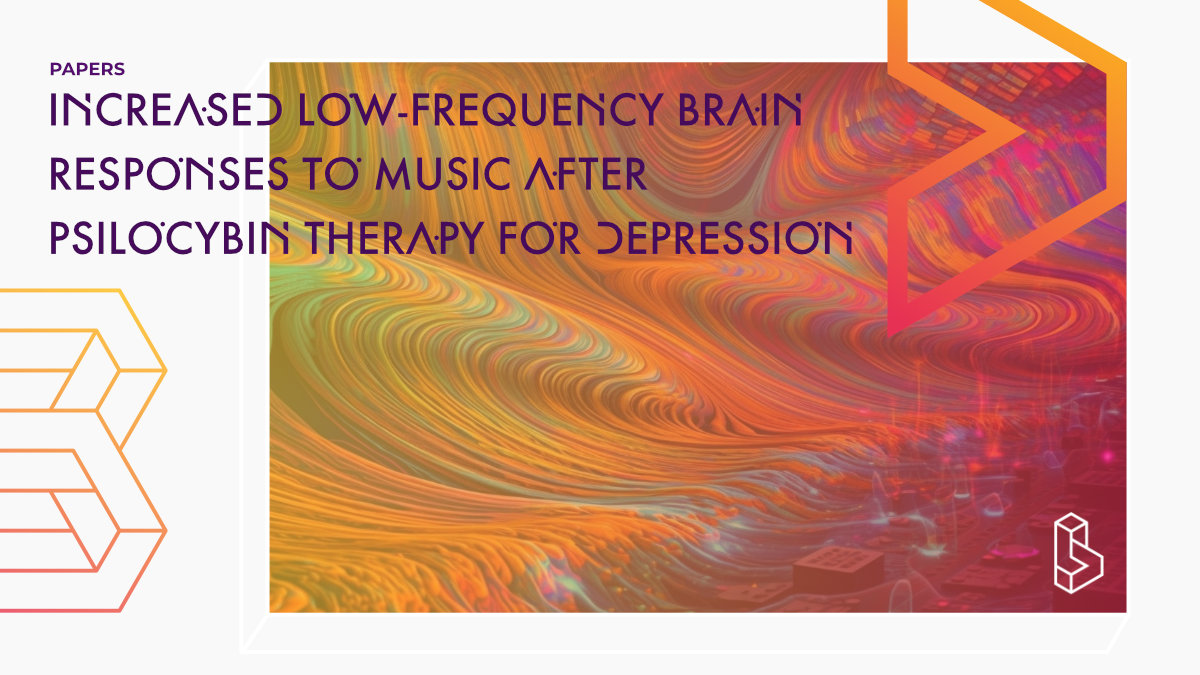This neuroimaging study (n=19) used fMRI and ALFF techniques to assess the brain’s response to music after administering psilocybin to participants with treatment-resistant depression (TRD). A comparison of treatment effects showed relative increases for the music scan in the bilateral superior temporal lobes and supramarginal gyrus, and relative decreases in the medial frontal lobes for the resting-state scan. ALFF in these music-related clusters was significantly correlated with the intensity of subjective effects felt during the dosing sessions implying an elevated response to music following psilocybin therapy.
Abstract
“Background Psychedelic-assisted psychotherapy with psilocybin is an emerging therapy with great promise for depression, and modern psychedelic therapy (PT) methods incorporate music as a key element. Music is an effective emotional/hedonic stimulus that could also be useful in assessing changes in emotional responsiveness following PT.
Methods Brain responses to music were assessed before and after PT using functional Magnetic Resonance Imaging (fMRI) and ALFF (Amplitude of Low Frequency Fluctuations) analysis methods. Nineteen patients with treatment-resistant depression underwent two treatment sessions involving administration of psilocybin, with MRI data acquired one week prior and the day after completion of psilocybin dosing sessions.
Results Comparison of music-listening and resting-state scans revealed significantly greater ALFF in bilateral superior temporal cortex for the post-treatment music scan, and in the right ventral occipital lobe for the post-treatment resting-state scan. ROI analyses of these clusters revealed a significant effect of treatment in the superior temporal lobe for the music scan only. Voxelwise comparison of treatment effects showed relative increases for the music scan in the bilateral superior temporal lobes and supramarginal gyrus, and relative decreases in the medial frontal lobes for the resting-state scan. ALFF in these music-related clusters was significantly correlated with intensity of subjective effects felt during the dosing sessions.
Limitations Open-label trial. Relatively small sample size.
Conclusions These data suggest an effect of PT on the brain’s response to music, implying an elevated responsiveness to music after psilocybin therapy that was related to subjective drug effects felt during dosing.”
Authors: Matthew B. Wall, Cynthia Lam, Natalie Ertl, Mendel Kaelen, Leor Roseman, David J. Nutt & Robin Carhart-Harris
An earlier version of this article came out as a pre-print in February 2022 (this version is also visible below as the newer one is not publicly available).
Summary of Increased low-frequency brain responses to music after psilocybin therapy for depression
The use of psychotropic compounds for medicinal, spiritual, and recreational purposes has ancient origins. Modern neuroscientific research is beginning to understand the potential physiological and psychopharmacological mechanisms behind these therapeutic effects. Music has been enjoyed across cultures and throughout human history and has deep biological and evolutionary foundations. It has also been used in a therapeutic context dating back to at least Pythagoras and is a potential tool for indexing anhedonia, a common symptom of depression. Recent research has shown that classic psychedelics can enhance the subjective emotional response to music, and that the hippocampus is involved in both.
Wall and colleagues used functional Magnetic Resonance Imaging (fMRI) to examine the effects of psychedelic therapy for depression on the brain’s response to music and the relationship between the derived ALFF results and subjective clinical/psychometric results obtained during and after the therapy sessions.
Find this paper
Increased low-frequency brain responses to music after psilocybin therapy for depression
https://doi.org/10.1016/j.jad.2023.04.081
Open Access | Google Scholar | Backup | 🕊
Cite this paper (APA)
Wall, M. B., Lam, C., Ertl, N., Kaelen, M., Roseman, L., Nutt, D. J., & Carhart-Harris, R. L. (2023). Increased low-frequency brain responses to music after psilocybin therapy for depression. Journal of Affective Disorders
Study details
Compounds studied
Psilocybin
Topics studied
Music
Depression
Neuroscience
Treatment-Resistant Depression
Study characteristics
Original Re-analysis
Open-Label
Participants
19
Humans
Authors
Authors associated with this publication with profiles on Blossom
David NuttDavid John Nutt is a great advocate for looking at drugs and their harm objectively and scientifically. This got him dismissed as ACMD (Advisory Council on the Misuse of Drugs) chairman.
Leor Roseman
Leor Roseman is a researcher at the Centre for Psychedelic Research, Imperial College London. His work focussed on psilocybin for depression, but is now related to peace-building through psychedelics.
Robin Carhart-Harris
Dr. Robin Carhart-Harris is the Founding Director of the Neuroscape Psychedelics Division at UCSF. Previously he led the Psychedelic group at Imperial College London.
Mendel Kaelen
Mendel Kaelen is a neuroscientist and entrepreneur, researching and developing a new category of psychotherapeutic tools for care-seekers and care-providers. Mendel has researched the incomparable effects of music on the brain during LSD-assisted psychotherapy. His work has determined how LSD increases enhanced eyes-closed visual imagery, including imagery of an autobiographical nature. This gives light to how music can be used as another dimension in helping psychotherapists create the ideal setting for their patients.
Institutes
Institutes associated with this publication
Imperial College LondonThe Centre for Psychedelic Research studies the action (in the brain) and clinical use of psychedelics, with a focus on depression.
Compound Details
The psychedelics given at which dose and how many times
Psilocybin 10 - 25mg | 2x
Linked Research Papers
Notable research papers that build on or are influenced by this paper
Psilocybin with psychological support for treatment-resistant depression: an open-label feasibility studyThis is the first modern study (n=12) on psilocybin and its effects on treatment-resistant depression (TRD). It shows that two sessions with psilocybin (10mg and 25mg) in combination with psychological support can reduce depressive symptoms over periods of one week to three months after treatment. Psilocybin was well tolerated by all of the patients, and no serious or unexpected adverse events occurred.

